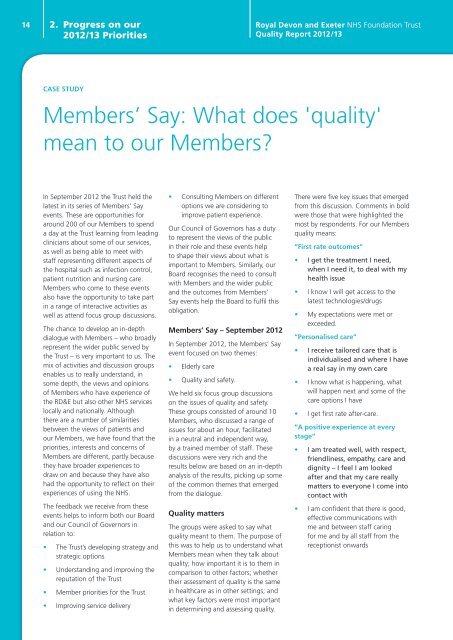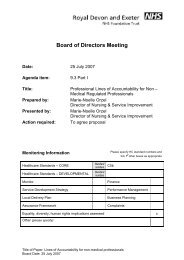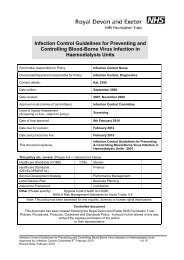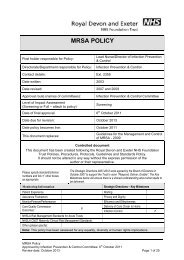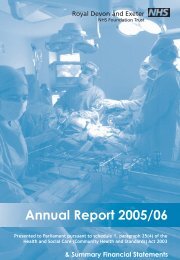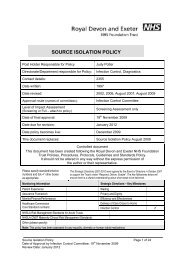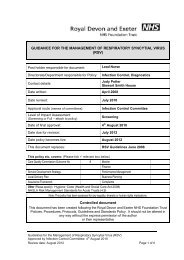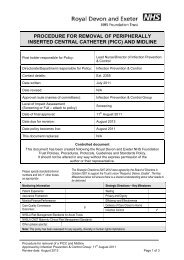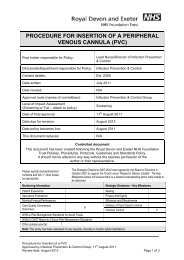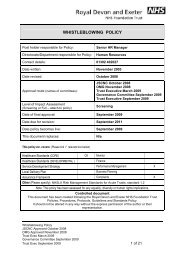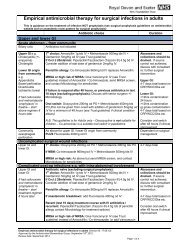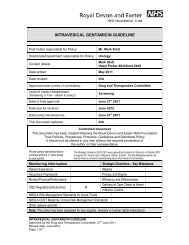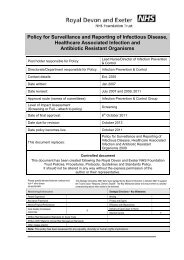Annual Report and Accounts 2012/13 - Royal Devon & Exeter Hospital
Annual Report and Accounts 2012/13 - Royal Devon & Exeter Hospital
Annual Report and Accounts 2012/13 - Royal Devon & Exeter Hospital
You also want an ePaper? Increase the reach of your titles
YUMPU automatically turns print PDFs into web optimized ePapers that Google loves.
14 2. Progress on our<br />
<strong>2012</strong>/<strong>13</strong> Priorities<br />
<strong>Royal</strong> <strong>Devon</strong> <strong>and</strong> <strong>Exeter</strong> NHS Foundation Trust<br />
Quality <strong>Report</strong> <strong>2012</strong>/<strong>13</strong><br />
CASE STUDY<br />
Members’ Say: What does 'quality'<br />
mean to our Members?<br />
In September <strong>2012</strong> the Trust held the<br />
latest in its series of Members’ Say<br />
events. These are opportunities for<br />
around 200 of our Members to spend<br />
a day at the Trust learning from leading<br />
clinicians about some of our services,<br />
as well as being able to meet with<br />
staff representing different aspects of<br />
the hospital such as infection control,<br />
patient nutrition <strong>and</strong> nursing care.<br />
Members who come to these events<br />
also have the opportunity to take part<br />
in a range of interactive activities as<br />
well as attend focus group discussions.<br />
The chance to develop an in-depth<br />
dialogue with Members – who broadly<br />
represent the wider public served by<br />
the Trust – is very important to us. The<br />
mix of activities <strong>and</strong> discussion groups<br />
enables us to really underst<strong>and</strong>, in<br />
some depth, the views <strong>and</strong> opinions<br />
of Members who have experience of<br />
the RD&E but also other NHS services<br />
locally <strong>and</strong> nationally. Although<br />
there are a number of similarities<br />
between the views of patients <strong>and</strong><br />
our Members, we have found that the<br />
priorities, interests <strong>and</strong> concerns of<br />
Members are different, partly because<br />
they have broader experiences to<br />
draw on <strong>and</strong> because they have also<br />
had the opportunity to reflect on their<br />
experiences of using the NHS.<br />
The feedback we receive from these<br />
events helps to inform both our Board<br />
<strong>and</strong> our Council of Governors in<br />
relation to:<br />
• The Trust’s developing strategy <strong>and</strong><br />
strategic options<br />
• Underst<strong>and</strong>ing <strong>and</strong> improving the<br />
reputation of the Trust<br />
• Member priorities for the Trust<br />
• Improving service delivery<br />
• Consulting Members on different<br />
options we are considering to<br />
improve patient experience.<br />
Our Council of Governors has a duty<br />
to represent the views of the public<br />
in their role <strong>and</strong> these events help<br />
to shape their views about what is<br />
important to Members. Similarly, our<br />
Board recognises the need to consult<br />
with Members <strong>and</strong> the wider public<br />
<strong>and</strong> the outcomes from Members’<br />
Say events help the Board to fulfil this<br />
obligation.<br />
Members’ Say – September <strong>2012</strong><br />
In September <strong>2012</strong>, the Members’ Say<br />
event focused on two themes:<br />
• Elderly care<br />
• Quality <strong>and</strong> safety.<br />
We held six focus group discussions<br />
on the issues of quality <strong>and</strong> safety.<br />
These groups consisted of around 10<br />
Members, who discussed a range of<br />
issues for about an hour, facilitated<br />
in a neutral <strong>and</strong> independent way,<br />
by a trained member of staff. These<br />
discussions were very rich <strong>and</strong> the<br />
results below are based on an in-depth<br />
analysis of the results, picking up some<br />
of the common themes that emerged<br />
from the dialogue.<br />
Quality matters<br />
The groups were asked to say what<br />
quality meant to them. The purpose of<br />
this was to help us to underst<strong>and</strong> what<br />
Members mean when they talk about<br />
quality; how important it is to them in<br />
comparison to other factors; whether<br />
their assessment of quality is the same<br />
in healthcare as in other settings; <strong>and</strong><br />
what key factors were most important<br />
in determining <strong>and</strong> assessing quality.<br />
There were five key issues that emerged<br />
from this discussion. Comments in bold<br />
were those that were highlighted the<br />
most by respondents. For our Members<br />
quality means:<br />
“First rate outcomes”<br />
• I get the treatment I need,<br />
when I need it, to deal with my<br />
health issue<br />
• I know I will get access to the<br />
latest technologies/drugs<br />
• My expectations were met or<br />
exceeded.<br />
“Personalised care”<br />
• I receive tailored care that is<br />
individualised <strong>and</strong> where I have<br />
a real say in my own care<br />
• I know what is happening, what<br />
will happen next <strong>and</strong> some of the<br />
care options I have<br />
• I get first rate after-care.<br />
“A positive experience at every<br />
stage”<br />
• I am treated well, with respect,<br />
friendliness, empathy, care <strong>and</strong><br />
dignity – I feel I am looked<br />
after <strong>and</strong> that my care really<br />
matters to everyone I come into<br />
contact with<br />
• I am confident that there is good,<br />
effective communications with<br />
me <strong>and</strong> between staff caring<br />
for me <strong>and</strong> by all staff from the<br />
receptionist onwards


